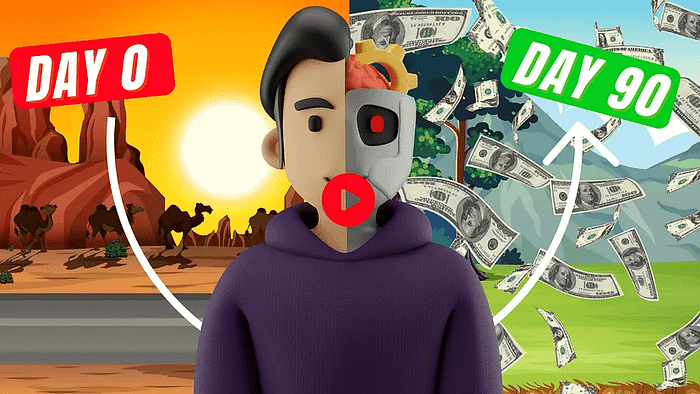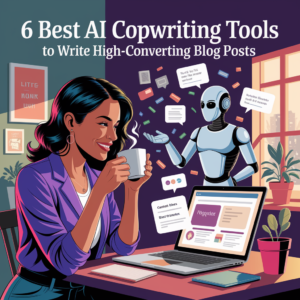How to Pivot Your Business as OpenAI GPTs Impact Agencies: My Survival Plan
OpenAI GPTs impact agencies in ways we never imagined possible, reshaping the entire AI industry landscape overnight. The recent announcements from OpenAI have sent shockwaves through the AI community, leaving many of us wondering about the future of our businesses.
As an AI automation agency owner, I’ve been closely monitoring these developments and speaking with industry experts to understand the full implications of these changes.
In this article, I’ll share my insights on how OpenAI GPTs impact agencies, what it means for our businesses, and how we can adapt to not only survive but thrive in this new AI-driven world.
We strongly recommend that you check out our guide on how to take advantage of AI in today’s passive income economy.
Table of Contents
The OpenAI Announcement: A Game-Changer
GPTs: Customizable AI Assistants
OpenAI’s introduction of GPTs (Generative Pre-trained Transformers) marks a significant milestone in AI development.
These custom versions of ChatGPT allow users and companies to create tailored AI assistants within the ChatGPT interface.
This development addresses a long-standing demand in the industry: the ability to have ChatGPT-like functionality with company-specific data and customizations.
OpenAI GPTs impact agencies by providing a solution that many have been seeking for months.
The Four Ingredients of GPTs
To understand how OpenAI GPTs impact agencies, we need to look at the four key components that make up these custom AI assistants:
- Prompting: This involves providing written instructions to the GPT about its behavior, tone, and capabilities. It’s similar to the prompting techniques we’ve been using, but now integrated directly into the GPT system.
- Knowledge Component: OpenAI has incorporated the ability to upload documents, CSVs, and other data sources directly into the GPT. This feature essentially absorbs the functionality of many third-party knowledge base solutions that have emerged in recent months.
- Memory: GPTs now have an improved form of memory that goes beyond the basic recent message history. This long-term memory via threading enhances the assistant’s ability to maintain context over extended interactions.
- Actions: Perhaps the most exciting feature, actions allow GPTs to perform external functions and interact with the real world. This could include integrations with other services or custom-coded functionality.
GPT-4 Upgrades and GPT Vision
In addition to the GPTs, OpenAI announced significant upgrades to GPT-4:
- Increased token limit to 128,000
- Improved speed and reduced costs
- Enhanced overall capabilities
They also introduced GPT Vision, opening up new possibilities for language models to interact with and understand images.
How OpenAI GPTs Impact Agencies: Challenges and Opportunities
The Initial Shock
When the news first broke, many of us in the AI agency world felt a pang of anxiety.
The fear that our hard work and business models might become obsolete overnight was very real.
However, as we dig deeper into these changes, it becomes clear that OpenAI GPTs impact agencies in ways that create new opportunities rather than closing doors.
The Core Opportunity Remains
It’s crucial to understand that the fundamental opportunity we built our agencies on hasn’t disappeared.
OpenAI GPTs impact agencies by simplifying many of the processes we were already implementing.
Our role in helping businesses integrate AI technology and facilitating its adoption remains as vital as ever.
The tools have changed, but our expertise in applying them effectively is still in high demand.
Simplified Service Delivery
OpenAI GPTs impact agencies by streamlining many of the complex processes we previously had to cobble together using various third-party platforms.
With knowledge integration, improved memory, and action capabilities built directly into the GPT system, we can now offer more robust solutions with less technical overhead.
This simplification allows us to focus more on strategy and implementation rather than wrestling with multiple tools and integrations.
First-Mover Advantage
As AI automation agency owners, we are uniquely positioned to capitalize on this new technology.
We already understand the underlying concepts and have experience implementing AI solutions for businesses.
OpenAI GPTs impact agencies by providing us with a more powerful and integrated toolset to work with.
This gives us a significant advantage in being the first to market with GPT-based solutions for businesses across various industries.
Addressing Concerns and Misconceptions
“Anyone Can Set Up a GPT Now”
One concern that might arise is the apparent ease with which GPTs can be set up.
The demos make it look simple, leading some to question where agencies can provide value.
However, OpenAI GPTs impact agencies by creating a new knowledge gap.
While basic setup might be straightforward, effectively implementing GPTs into business processes, creating custom actions, and integrating them with existing systems still requires significant expertise.
The Limitations of No-Code Solutions
While platforms like Zapier offer impressive functionality in demos, they have limitations when it comes to complex, large-scale business operations.
Custom-coded solutions and specialized functions are still necessary for connecting GPTs to databases, websites, and other business-critical systems.
OpenAI GPTs impact agencies by creating a demand for specialized knowledge in developing these custom integrations and actions.
The Rise of GPT-Specific Agencies
As businesses begin to realize the potential of GPTs, we’re likely to see a new breed of specialized agencies emerge.
These GPT-specific agencies will focus on setting up, managing, and continuously improving GPT systems for businesses.
This creates an opportunity for retainer-based services, where agencies can charge substantial monthly fees to maintain and expand GPT functionality across an organization.
Lessons from the OpenAI Announcement
The Cycle of Innovation and Integration
OpenAI’s approach of incorporating external innovations into their core offering provides valuable insights for the future of AI development.
We can expect this cycle to continue, with open-source and third-party developments being absorbed into major AI platforms over time.
OpenAI GPTs impact agencies by emphasizing the importance of staying agile and not over-committing to specific technologies that may soon be integrated into larger platforms.
Preparing for Autonomous AI Agents
OpenAI’s vision extends beyond the current GPT implementations.
Their goal appears to be preparing the world for a future where autonomous AI agents can communicate and work together seamlessly.
OpenAI GPTs impact agencies by positioning us as the bridge between current AI capabilities and this autonomous future.
Our role in helping businesses prepare for this transition becomes even more critical.
Strategies for AI Agencies Moving Forward
Stay Informed and Adaptable
The rapid pace of AI development means that staying informed is more critical than ever.
Regularly research new developments, attend conferences, and engage with the AI community to keep your knowledge current.
OpenAI GPTs impact agencies by requiring us to be lifelong learners and adaptable professionals.
Focus on Business Integration
While the technology is impressive, our true value lies in understanding how to integrate AI solutions into business processes effectively.
OpenAI GPTs impact agencies by shifting our focus from technical implementation to strategic business integration.
Develop a deep understanding of various industries and how GPTs can solve specific business challenges.
Develop Specialized Skills
As GPTs become more accessible, specialization becomes increasingly valuable.
Focus on developing skills in areas such as:
- Custom action development for GPTs
- Integration with legacy systems
- Industry-specific AI implementations
- AI ethics and governance
OpenAI GPTs impact agencies by creating new niches for specialized expertise.
Build a Strong Network
Collaborate with other professionals in the AI space, including developers, data scientists, and business strategists.
A strong network can help you stay ahead of trends and provide comprehensive solutions to clients.
OpenAI GPTs impact agencies by emphasizing the importance of collaborative ecosystems in the AI industry.
Educate Your Clients
Many businesses are still unaware of the potential impact of AI on their operations.
Position yourself as an educator and guide, helping clients understand the possibilities and implications of AI technology.
OpenAI GPTs impact agencies by creating a need for AI literacy among business leaders.
The Future of AI Agencies
Embracing the GPT-Centric Future
As we move forward, it’s clear that GPTs will play a central role in the AI landscape.
Agencies that embrace this shift and position themselves as GPT experts will have a significant advantage.
OpenAI GPTs impact agencies by redefining what it means to be an AI consultancy in the age of accessible, powerful language models.
Preparing for the Next Wave
While GPTs are the current focus, it’s essential to keep an eye on emerging technologies and trends.
The next breakthrough could be just around the corner, and successful agencies will be those that anticipate and prepare for these shifts.
OpenAI GPTs impact agencies by setting a precedent for rapid, transformative change in the AI industry.
Ethical Considerations and Responsible AI
As AI becomes more integrated into business processes, ethical considerations and responsible AI practices will become increasingly important.
Agencies that prioritize these aspects will build trust and credibility with clients.
OpenAI GPTs impact agencies by highlighting the need for ethical guidelines and responsible implementation strategies.
Conclusion
The introduction of OpenAI’s GPTs has undoubtedly shaken up the AI industry, but it has not spelled the end for AI automation agencies.
Instead, it has opened up new avenues for growth and specialization.
OpenAI GPTs impact agencies by providing us with more powerful tools to serve our clients and drive AI adoption across industries.
By staying informed, focusing on business integration, developing specialized skills, and educating our clients, we can not only survive but thrive in this new AI landscape.
The future of AI agencies is bright, filled with opportunities to shape the way businesses interact with and benefit from artificial intelligence.
As we navigate this exciting new territory, let’s embrace the changes and position ourselves at the forefront of the AI revolution.
The journey ahead is challenging, but for those willing to adapt and innovate, the rewards will be substantial.
OpenAI GPTs impact agencies in ways we are only beginning to understand, and it’s up to us to make the most of this transformative moment in AI history.
Frequently Asked Questions:
Why is OpenAI recognized for changing the industry?
OpenAI is recognized as a game-changer in the AI industry for several reasons:
- Breakthrough Technologies: OpenAI has consistently released cutting-edge AI models, with GPT (Generative Pre-trained Transformer) series being the most notable. These models have set new benchmarks in natural language processing and generation.
- Democratization of AI: By making powerful AI tools like ChatGPT available to the public, OpenAI has democratized access to advanced AI capabilities. This has sparked innovation across various sectors and allowed individuals and businesses of all sizes to leverage AI technology.
- Pushing Ethical Boundaries: OpenAI has been at the forefront of discussions about AI ethics and safety. Their approach to releasing AI models gradually and with safeguards has influenced industry standards for responsible AI development.
- Collaborative Approach: OpenAI’s partnership with Microsoft and other organizations has demonstrated a collaborative model for AI advancement, encouraging knowledge sharing and collective progress in the field.
- Rapid Iteration: The pace at which OpenAI improves its models and releases new versions has accelerated the entire field’s progress, forcing competitors to innovate faster.
OpenAI GPTs impact agencies by setting new standards for what’s possible in AI, continually raising the bar for the entire industry.
How will OpenAI affect the job market?
OpenAI’s technologies, particularly GPT models, are likely to have significant impacts on the job market:
- Automation of Routine Tasks: Many routine cognitive tasks, such as basic content creation, data analysis, and customer service, may become increasingly automated, potentially reducing demand for some roles.
- Creation of New Job Categories: As AI technologies evolve, new job roles focused on AI implementation, management, and ethics are emerging. This includes AI trainers, AI ethicists, and AI-human interaction designers.
- Skill Shift: There will be an increased demand for workers who can effectively work alongside AI, interpret AI outputs, and apply AI insights to business problems.
- Productivity Enhancement: In many fields, AI will serve as a productivity multiplier, allowing workers to focus on higher-value tasks and potentially increasing overall economic output.
- Disruption in Creative Industries: AI-generated content may disrupt industries like writing, graphic design, and music composition, though human creativity and oversight will likely remain valuable.
- Increased Demand for Technical Skills: There will be growing demand for professionals with skills in AI development, machine learning, data science, and related fields.
OpenAI GPTs impact agencies by necessitating a shift in skill sets and creating new opportunities for those who can effectively leverage and implement AI technologies.
How are companies using GPT?
Companies are finding diverse applications for GPT technology:
- Customer Service: Many businesses use GPT-powered chatbots to handle customer inquiries, providing 24/7 support and freeing up human agents for more complex issues.
- Content Creation: Marketing teams use GPT to generate ideas, draft content, and create personalized messaging at scale.
- Product Development: GPT is being used to analyze customer feedback, generate product descriptions, and even assist in brainstorming new product ideas.
- Data Analysis: Companies leverage GPT’s natural language processing capabilities to extract insights from large volumes of unstructured data.
- Code Assistance: Software development teams use GPT-powered tools to assist with coding, debugging, and documentation.
- Language Translation: GPT models are enhancing machine translation services, making global communication more accessible for businesses.
- Education and Training: Some organizations use GPT to create personalized learning materials and interactive training programs.
- Legal and Compliance: GPT is being used to assist in contract analysis, legal research, and ensuring compliance with regulations.
OpenAI GPTs impact agencies by providing tools that can be integrated into various business processes, enhancing efficiency and innovation across multiple sectors.
Who has partnered with OpenAI?
OpenAI has formed several significant partnerships:
- Microsoft: The most prominent partnership is with Microsoft, which has invested billions of dollars in OpenAI. This collaboration gives Microsoft preferred access to OpenAI’s technologies and allows for integration into Microsoft’s cloud and AI services.
- Shutterstock: The stock image company partnered with OpenAI to integrate DALL-E technology for AI-generated images.
- Anthropic: While not a direct partnership, Anthropic, an AI safety startup, was founded by former OpenAI researchers and has received significant funding from individuals associated with OpenAI.
- Be My Eyes: This app for visually impaired individuals partnered with OpenAI to integrate GPT-4 into their service, enhancing the app’s ability to assist users.
- Duolingo: The language learning app has integrated GPT-4 to enhance its conversational AI features.
- Khan Academy: The educational platform is working with OpenAI to develop AI-powered tutoring capabilities.
- Stripe: The payment processing company is using GPT-4 to enhance its documentation and customer support.
OpenAI GPTs impact agencies by setting a precedent for collaborative AI development and implementation, encouraging more partnerships between AI developers and various industries.
These partnerships demonstrate the wide-ranging applications of OpenAI’s technologies and their potential to transform various sectors. As OpenAI continues to develop its AI models, we can expect to see more collaborations and integrations across different industries.

We strongly recommend that you check out our guide on how to take advantage of AI in today’s passive income economy.




